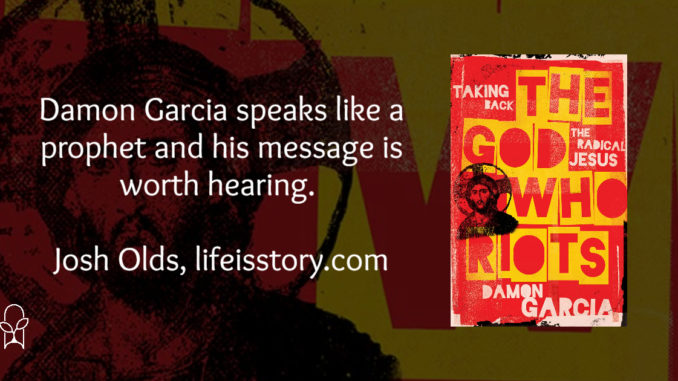
Published by Broadleaf Books on August 23, 2022
Genres: Social Justice, Non-Fiction
Buy on Amazon
Goodreads

For thousands of years, religious messages have been used to either uphold the status quo or upend it. And while we are all very familiar with the kind of conservative Christianity that suppresses liberation and justifies oppression, progressive Christians are just as guilty of upholding unjust systems when we prioritize harmony and unity over justice. True justice requires us to choose sides. True justice requires action. When we look at Scripture, we see that the God of the Bible was never neutral. Again and again God chooses the side of the oppressed. Jesus said the Spirit of the Lord anointed him to let the oppressed go free, and those of us who claim to follow Jesus today must commit to this radical mission of liberation.
In The God Who Riots, popular YouTuber and public theologian Damon Garcia uses his frank, tell-it-like-it-is style to connect us with the Jesus who flipped tables in the temple and led an empire-destabilizing movement for liberation. The spirit of this God is embodied in today's protests, riots, and strikes. As we join this struggle for liberation, we are joining the God who riots alongside us, within us, and through us.
Martin Luther King Jr said “A riot is the language of the unheard.” Throughout history, we’ve seen how protests have turned into rioting as anger and grief over injustice have expressed themselves in very physical forms. I’ve often wondered if those kinds of actions held any value except for catharsis. I mean, it seems like all that rioting tends to do is give the opposition a thing to pick on to justify further future injustice. We can also look to nonviolent resistance and see that nonviolent revolutions are more successful that violent ones. So…A God Who Riots? I’m there in solidarity. I understand it emotionally. But also, Jesus is a God who sacrifices.
That was my mindset at the beginning of Damon Garcia’s A God Who Riots. I can concede that my pacifism is a result of my privilege. I’m a white heterosexual middle-class male. What substantive outrage do I have to riot against? Only the oppressed have to riot. Could Garcia change my perspective by getting me to see through the eyes of someone with more of a reason to riot? Well, it depends on how you define a riot.
The theological center of A God Who Riots is Jesus’s cleansing of the Temple, “a planned demonstration and riot, complete with property destruction, looting, and social unrest.” Garcia begins his book with an explanation of that story and a reminder—both personal and biblical—about Scripture calls us to radical change. Religion has been used to empower people to change the world; religion has been used to suppress change. From there, Garcia sets the historical context for Jesus’s explosive demonstration, showing readers how radical a move this actually was by the Prince of Peace.
However, A God Who Riots fails—at least for me—to do a couple of things: First, it doesn’t convince me that Jesus’s cleansing of the Temple is comparable to the type of riots we often see to demonstrate against injustice today. Second, it does not set boundaries around what kind of rioting may be appropriate and which may not. Simply put, turning over some tables and disrupting the corrupt economy within the Temple grounds is difficult to compare to mass burning and looting. Somewhere, there must be a boundary. Where is that boundary? If we are going to have the discussion about rioting, we must understand how to riot well. While Garcia covers this in the more expansive metaphorical term, there’s not as much clarity on actual physical specifics.
In the end, I resonate with a lot of what Garcia says. His call to embrace a radical Jesus—a transforming rather than reforming Presence—is bold, powerful, and prophetic. His perspective on rioting as more than just destruction, but rather a feeling of holy discontent that serves as a catalyst of change lifts “rioting” out of its physically violent context into a greater, more expansive, and more helpful paradigm. His encouragement that we must take sides, we must choose to side with the poor and powerless, is absolutely true. Damon Garcia speaks a prophet and his message is worth hearing.
